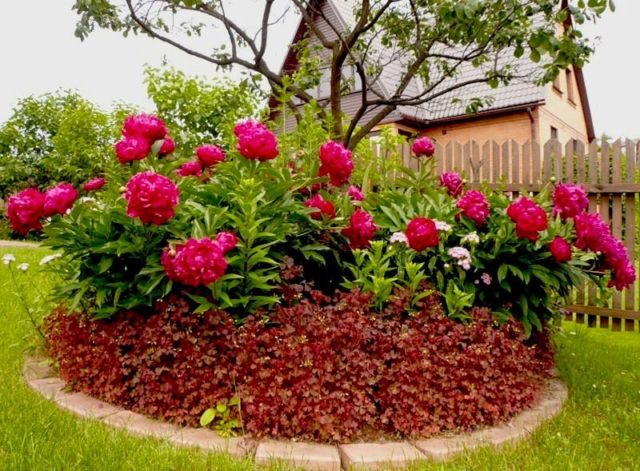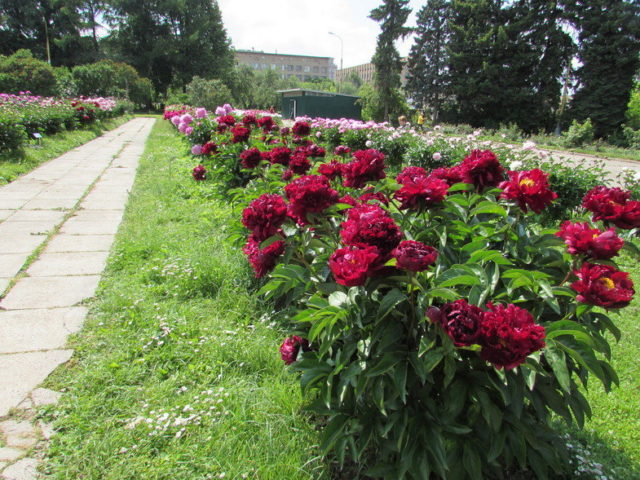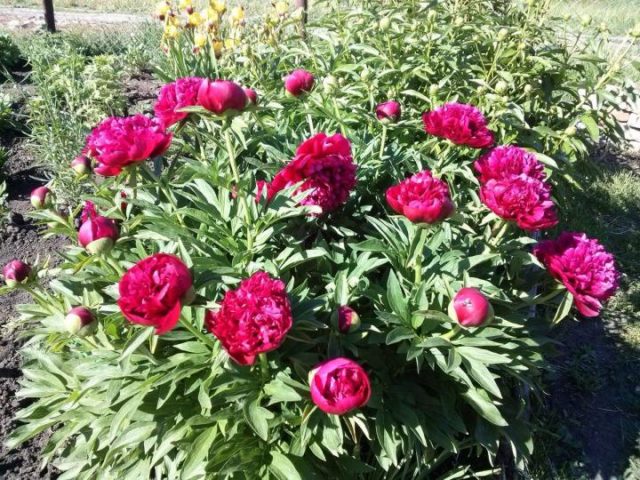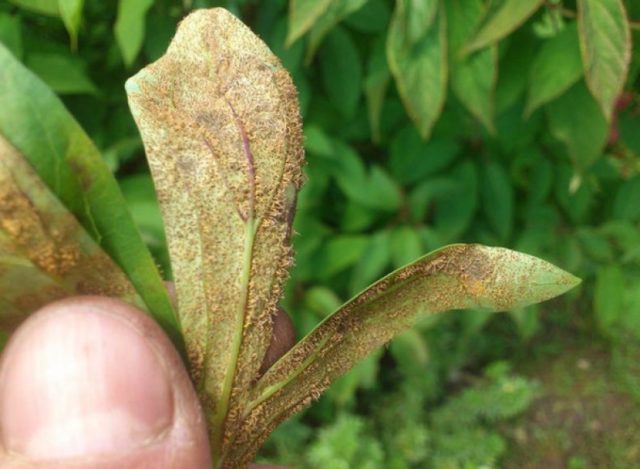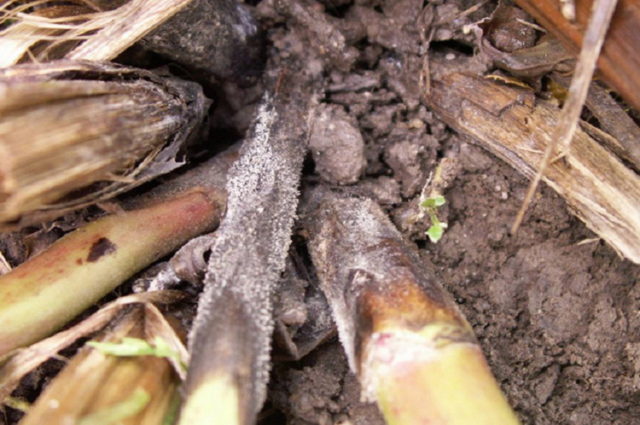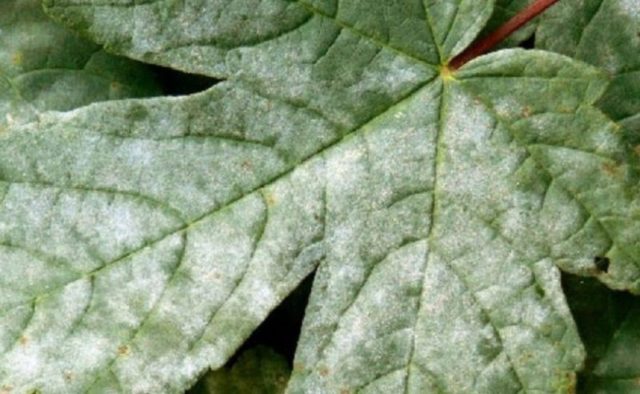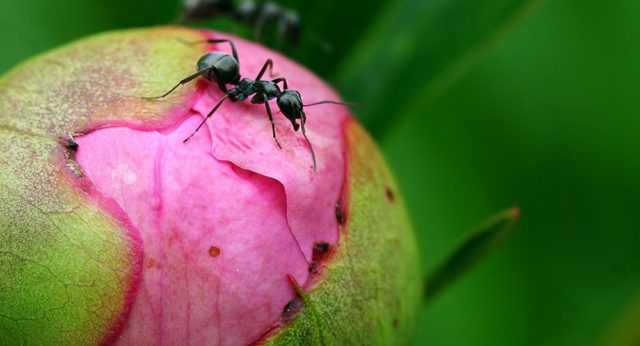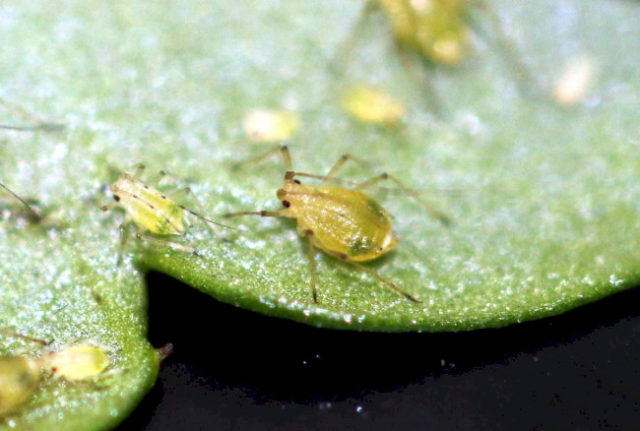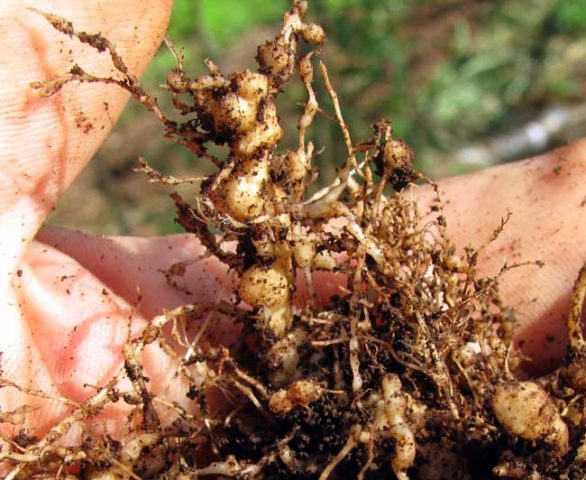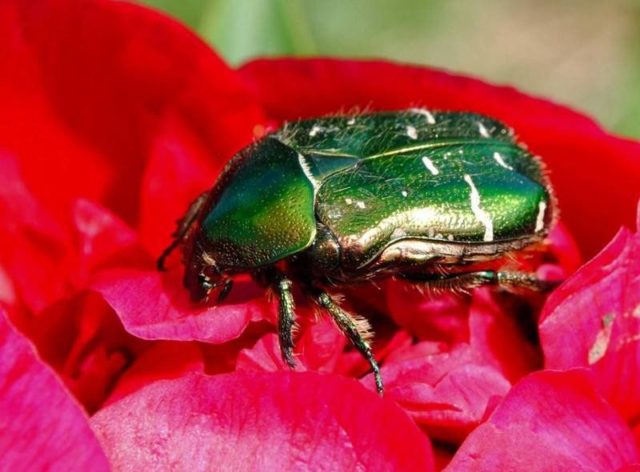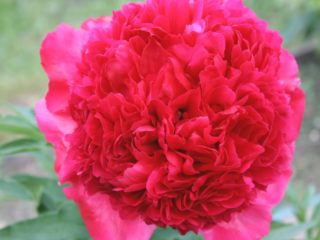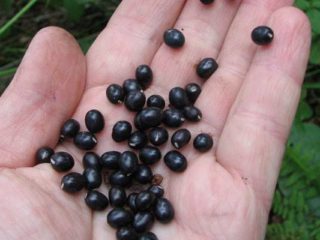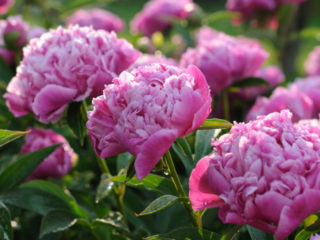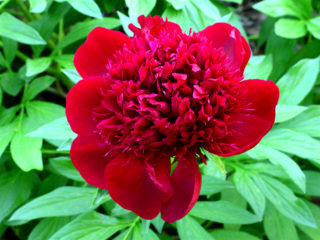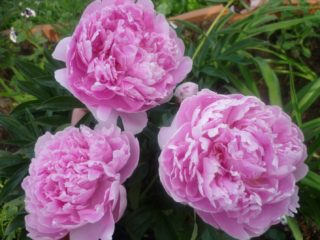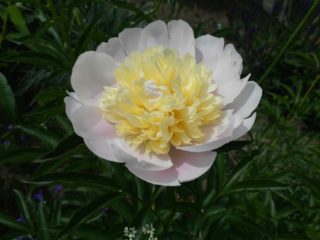Content
- 1 Benefits of growing burgundy peonies
- 2 The best varieties of burgundy peonies
- 2.1 Moscow
- 2.2 Yulia Drunina
- 2.3 Vladimir Novikov
- 2.4 Nikolay Vavilov
- 2.5 Paul M. Wild
- 2.6 Karen Gray
- 2.7 Red Spider
- 2.8 America
- 2.9 Angelo Cobb Freeborn
- 2.10 Shima-Nishiki
- 2.11 Red Grace
- 2.12 Lastres
- 2.13 Scarlet Sails
- 2.14 Akron
- 2.15 Oslo
- 2.16 Kiao Sisters
- 2.17 Black Panther
- 2.18 Felix Supram
- 2.19 Armani
- 2.20 Kansas
- 2.21 Black Pearl
- 2.22 Highlight
- 2.23 Sword Dance
- 2.24 Peter Brand
- 2.25 Dragon flowers
- 2.26 Red Charm
- 2.27 Henry Boxtos
- 2.28 Chokelit Soulde
- 3 The use of burgundy peonies in design
- 4 Planting and caring for burgundy peonies
- 5 Diseases and pests
- 6 Conclusion
Burgundy peonies are a very popular variety of garden flowers. There are many varieties, and in order to choose the most beautiful ones, you need to get acquainted with brief descriptions.
Benefits of growing burgundy peonies
Burgundy peonies are represented by a wide variety of varieties, but compared to other varieties they can be considered few in number. There are several advantages to growing flowers in rich, dark shades:
- Rare color. The selection of burgundy varieties is associated with certain difficulties, therefore, among the abundance of white and red peonies, burgundy varieties can not be found very often in summer cottages. A blooming perennial with a rich dark hue, it is guaranteed to attract the attention of guests.
- Lush flowering. During the period of maximum decorativeness, peony bushes look very beautiful, large flowers on them are arranged in a cluster, close to each other.
- Large buds. In most varieties, the size of the buds is 15-25 cm in diameter, even dwarf burgundy peonies bear large flowers compared to their overall dimensions.
- Brightness. It is the burgundy varieties that look most impressive in the garden; they stand out against any background.
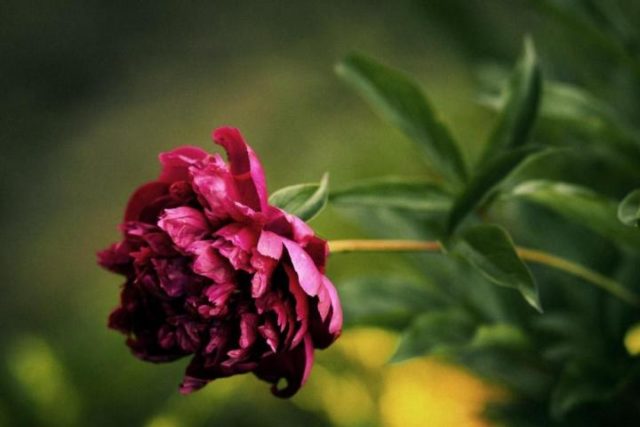
Burgundy peonies bloom in early June
The advantages of burgundy varieties also include early flowering. Most varieties bloom already in June and decorate the garden with beautiful bright splashes, some varieties begin to bloom at the end of May.
The best varieties of burgundy peonies
Among the most popular varieties, we can list several varieties of burgundy peonies. They differ mainly in size; there is a difference in the shades of flowering and the dimensions of the inflorescences.
Moscow
A miniature variety of burgundy peony with stems up to 50 cm tall. It bears large buds of deep ruby color with long yellow staminodes, or stamens without anthers. The diameter of the buds reaches 10 cm. The leaves of the plant are rich green, patterned, the variety emits a light, delicate aroma.
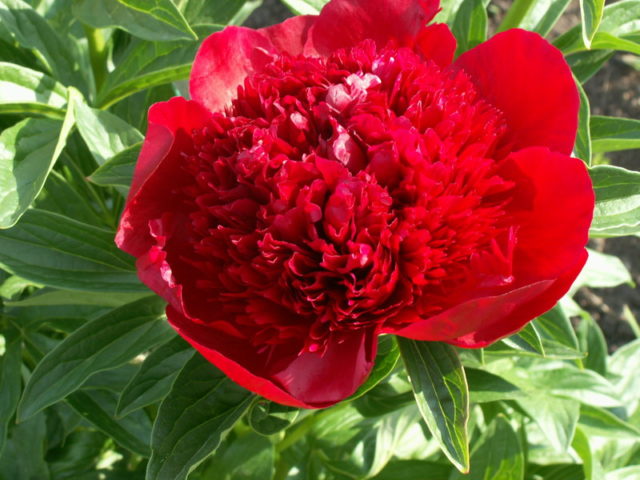
Moscow is suitable for growing in soil and in flowerpots
Yulia Drunina
The hybrid variety belongs to tree peonies and rises up to 1 m above the ground. The bush consists of numerous strong stems; the peony flowers are red-burgundy, with a purple spot at the base, with white staminodes and purple-yellow stamens. The buds are quite large, their width can reach 20 cm.
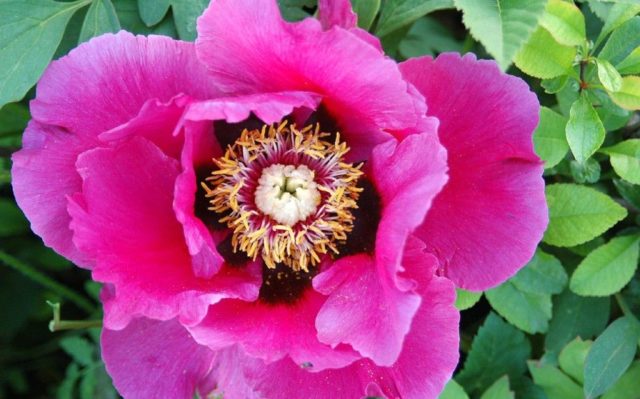
You can recognize the Yulia Drunina variety by the bright dark spot at the base of the flower
Vladimir Novikov
The tree-like variety is capable of reaching 1.5 m above ground level.The burgundy peony bears large flowers up to 20 cm in red-violet color, with a dark purple stripe running down the center of the petals. The edges of the petals are corrugated. The stamens are crimson with yellow anthers, the burgundy peony emits a strong pleasant smell.
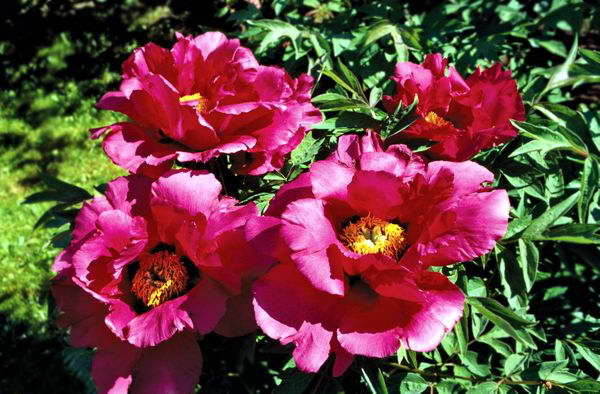
Vladimir Novikov begins to bloom in mid-June
Nikolay Vavilov
Tree-like hybrid variety up to 1 m tall. The flowers of the plant are large, about 20 cm, the petals are arranged in the shape of a bowl. The color of the buds is burgundy-violet, with a darker shade in the middle, and the stamens of the perennial are purple with yellow anthers at the ends. A flowerbed with a burgundy peony of this variety looks very bright.
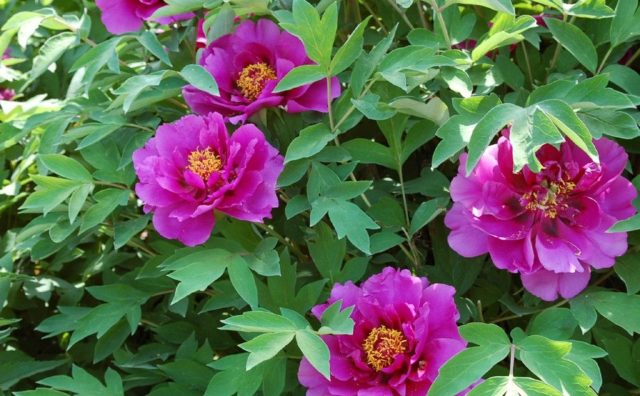
Nikolay Vavilov is highly resistant to drought and fungal diseases
Paul M. Wild
The herbaceous variety rises up to 1 m above the ground and bears semi-double flowers up to 18 cm wide. The color of the buds is burgundy with a slight crimson tint; the petals are concave in shape and located relative to each other, like scales.
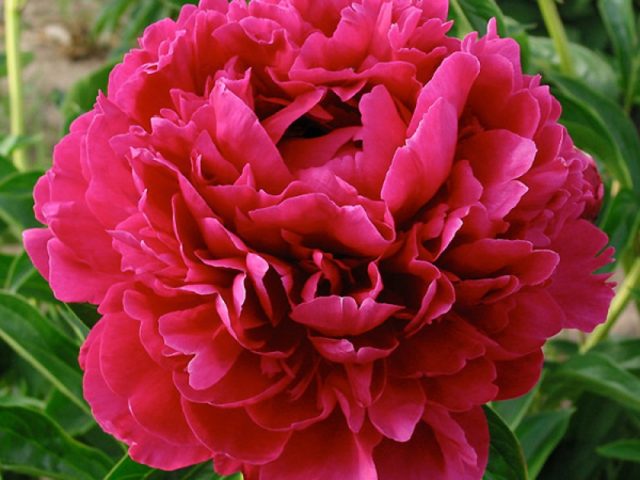
Paul M. Wilde can withstand temperatures down to -40°C and can be grown in Siberia
Karen Gray
The herbaceous peony bush grows up to 70 cm and bears bright burgundy flowers up to 16 cm in diameter, anemoid in shape. In the middle of the flowers there are wide pale pink staminodes and yellow stamens, the stems are reddish, with matte dark green leaves. The burgundy peony variety looks decorative not only during flowering, but also after it.
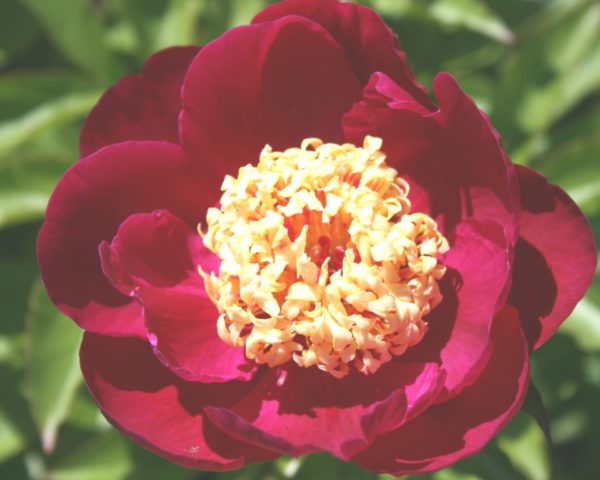
Karen Gray brings not only central but also side buds
Red Spider
The red-burgundy peony is a dwarf hybrid - its height is no more than 50 cm.The flowers of the variety are double, burgundy-crimson in color, up to 10 cm wide. The petals are arranged in the shape of a bowl, they are round on the outside, and narrow and elongated, fringed in the center. The variety is grown not only in the garden, but also in closed containers.
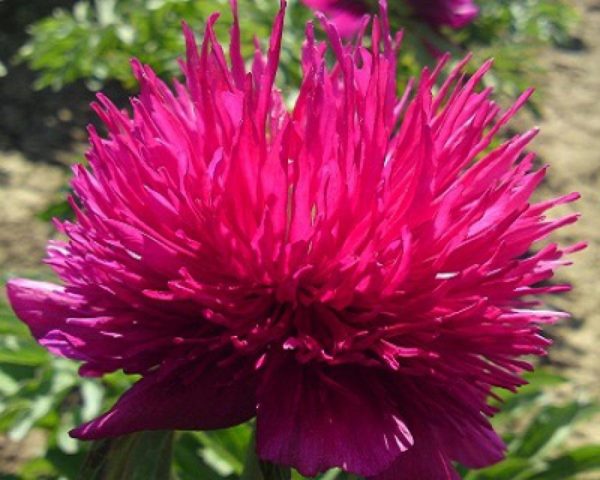
Dwarf Red Spider is well suited for cutting and forming bouquets
America
A medium-sized garden peony rises up to 75 cm and produces large dark burgundy flowers up to 21 cm in diameter. The shape of the flowers is simple, the petals are corrugated, with smooth edges, the shape of the buds resembles tulips. The variety bears up to 4 buds on each stem; short yellow stamens are located in the center of the flowers.
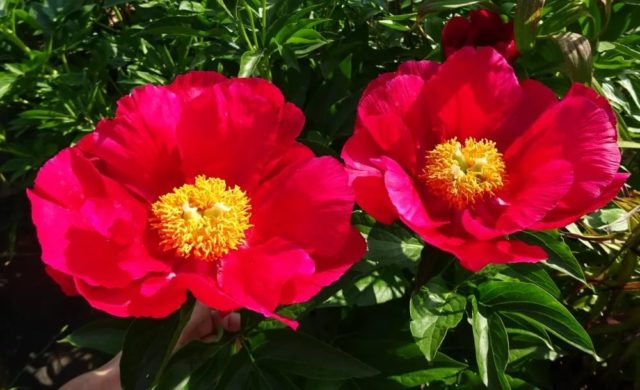
Burgundy variety America received a gold medal from the American Peony Society in 1992
Angelo Cobb Freeborn
The hybrid burgundy variety is tall, it grows up to 90 cm. It blooms with double spherical flowers, the color is dark crimson with a faint salmon tint at sunset. The buds grow up to 18 cm in diameter and emit a pleasant, subtle aroma. The plant has soft green leaves and looks very decorative.
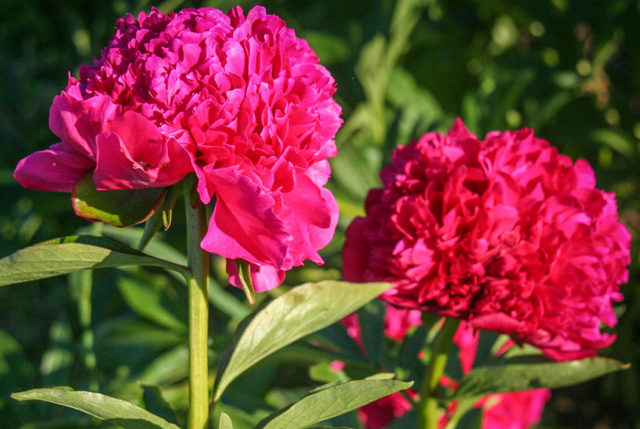
Angelo Cobb Freeborn was bred in America back in 1943
Shima-Nishiki
The tree-like tall variety is capable of rising up to 1.5 m above the ground. Peony flowers are semi-double; one bush can contain not only burgundy, but also white-scarlet and almost white flowers. The petals are concave and cup-shaped, up to 16 cm in diameter, the leaves are rich green with a noticeable bronze tint.
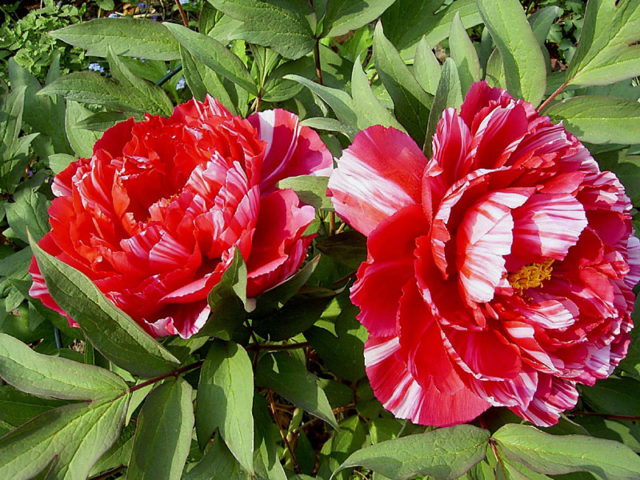
Shima-Nishiki begins to bloom at the end of May
Red Grace
The herbaceous hybrid plant can rise up to 1.2 m above the ground. The flowers of the burgundy peony are double, spherical, and dark cherry in color. The diameter of individual flowers reaches 18 cm, the petals are round in shape.
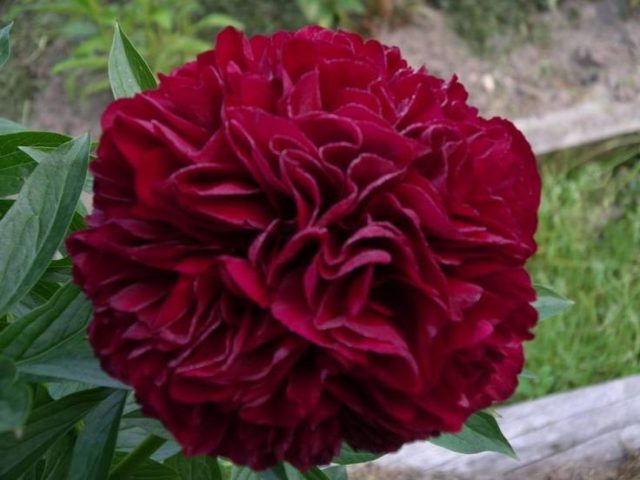
Red Grace produces only central burgundy buds - one on each stem
Lastres
A herbaceous hybrid plant grows up to 70 cm in height. It blooms with semi-double large flowers up to 19 cm each; the buds are deep burgundy in color with a brick tint. The stamens in the flowers are yellow, with red veins, the leaves of the plant are light green. The perennial exudes a pleasant light aroma during the flowering period.
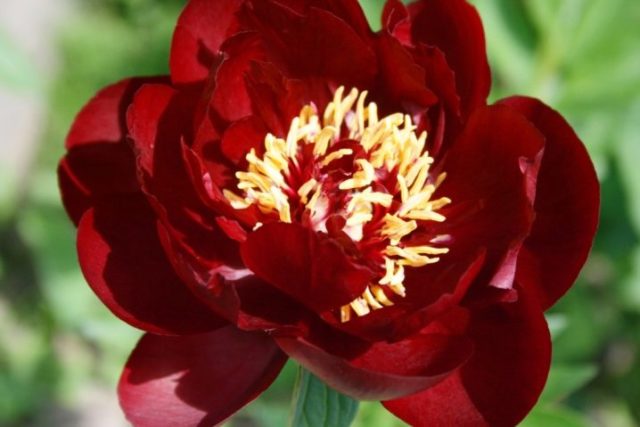
Lastres almost does not fade in the sun and is suitable for planting in open areas
Scarlet Sails
The tree-like variety of burgundy peony is very large and can grow up to 2 m. The flowers are purple-burgundy in color; a single bush can bear up to 70 flowers. The petals are arranged in the shape of a crown; the flowers reach 16 cm in size. The variety has beautiful carved leaves of bright green color.
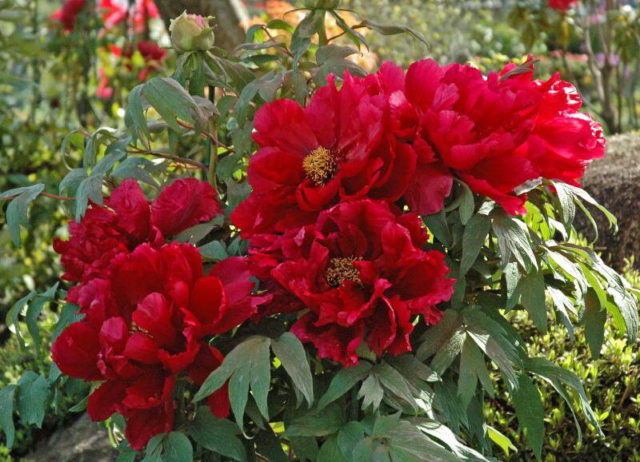
Scarlet sails can produce up to 70 burgundy buds on one bush
Akron
The burgundy peony rises above the ground on average up to 1 m and blooms with large spherical flowers up to 17 cm wide. The flowers are carmine-burgundy in color, with corrugated staminodes topped with cream tips in the center. The stems of the variety are reddish in color, with long dark green decorative leaves.
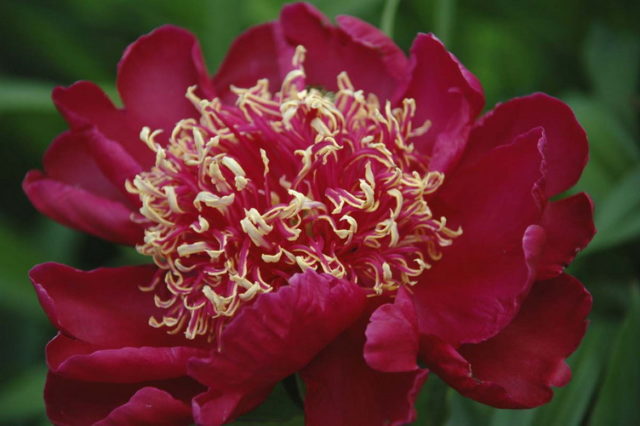
Akron blooms in mid-June and has a light scent.
Oslo
A dwarf variety of burgundy peony grows no more than 50 cm in height. The flowers of the variety are anemoid, burgundy-pink in color, only about 10 cm in diameter. In the middle of the flowers there are large stamens with yellow tips.
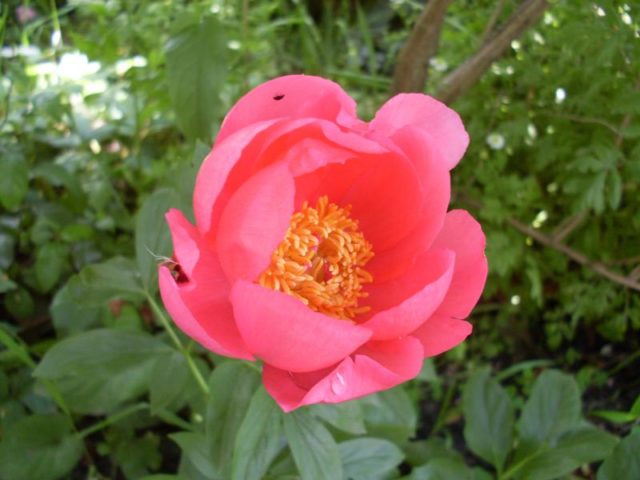
Oslo is suitable for arranging bouquets due to its compact size
The miniature variety is grown both in the ground and in flowerpots. The flowers have a soft, pleasant scent.
Kiao Sisters
A tall tree-like perennial reaches 1.5 m in height. The pink-burgundy peony bears beautiful semi-double flowers in which burgundy and white shades are mixed. The dimensions of the flowers are very large - they reach up to 25 cm. The stems of the variety are straight, rigid, do not bend under the weight of the inflorescences, the leaves are large and carved, pale green in color.
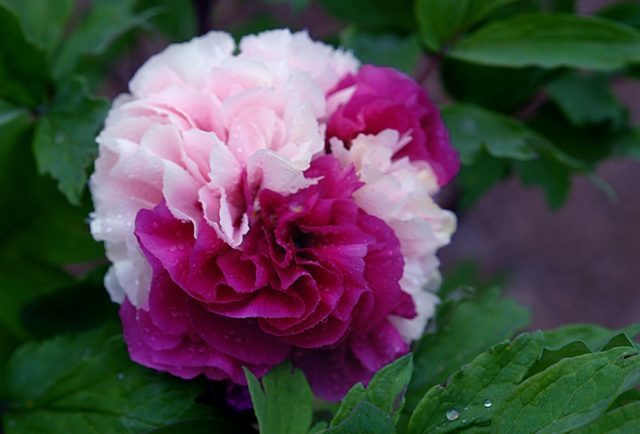
An adult bush of Sister Kiao produces up to 100 burgundy buds
Black Panther
A tree-like dark burgundy variety of peony rises up to 1.5 m above the ground and produces semi-double flowers of large sizes - up to 25 cm. The color of the flowers is very interesting - dark, rich burgundy, with pronounced chocolate tones. The perennial emits a pleasant, rich scent; bright green leaves look beautiful against the background of bright flowers.
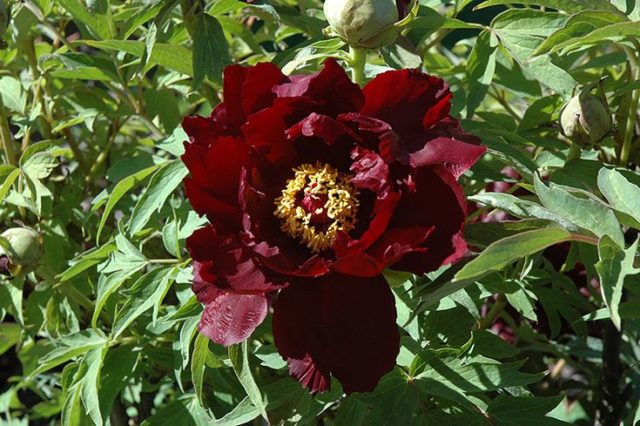
Black Panther can bloom for about 20 years in one place
Felix Supram
The double burgundy peony grows up to 90 cm above the ground and produces beautiful rose-like flowers up to 16 cm in diameter each. The color of the buds is burgundy-violet, with lilac shades. The color of the buds largely depends on the weather; on sunny days the plant looks brighter, on cloudy days it takes on a rich dark color.
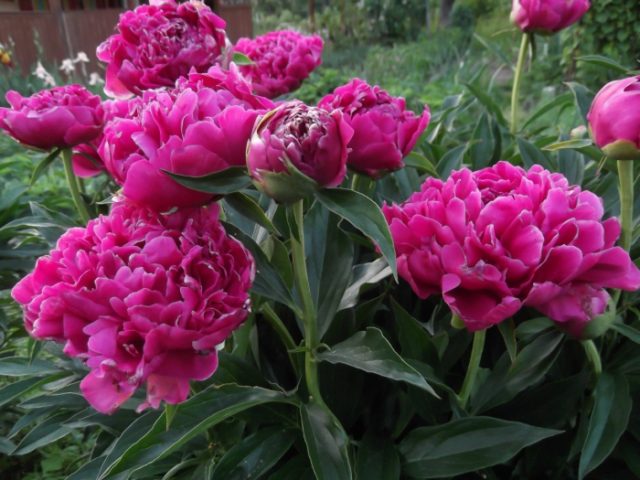
Felix Supreme emits a strong rosehip aroma when flowering
Armani
The medium-sized variety rises to 1 m and produces double buds about 23 cm wide. The color of the variety is very rich, dark wine, and as the buds develop, the intensity of the color only increases. The Armani variety has a strong, pleasant aroma, and in the fall the peony leaves also acquire a burgundy hue. The plant is considered quite rare.
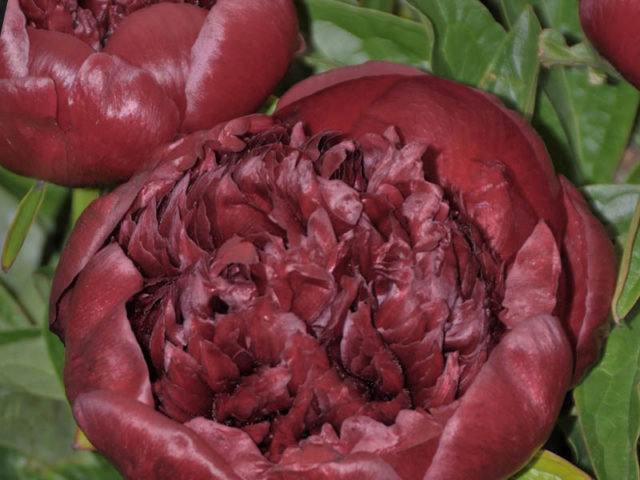
In autumn, Armani leaves change color to dark red.
Kansas
A medium-sized herbaceous perennial rises up to 1 m above ground level, and the flowers grow up to 20 cm in diameter. The structure of the buds is very double, reminiscent of rose flowers, the petals are very densely arranged. The peony is burgundy-raspberry in color and emits a rich, sweetish aroma during the decorative period.
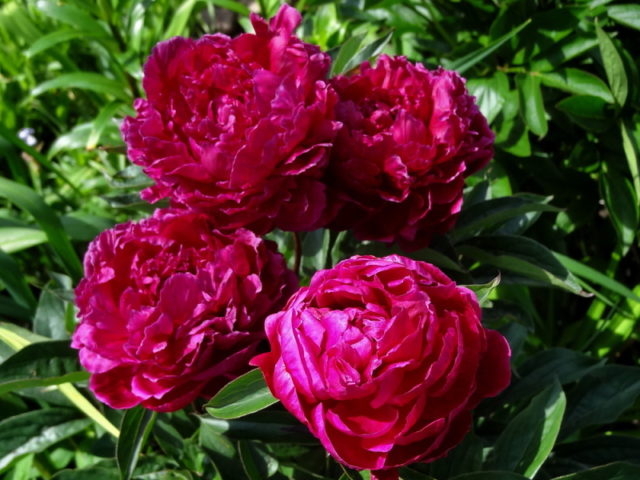
Kansas - Gold Medal Winner from the American Peony Society for 1957
Black Pearl
Quite rare, but very beautiful variety up to 1 m tall. It bears spherical buds of dark burgundy color with a chocolate tint; the opened flowers reach 15 cm and slightly resemble a carnation in shape. It exudes a light, pleasant aroma; its decorative effect is enhanced by large dark green leaves.
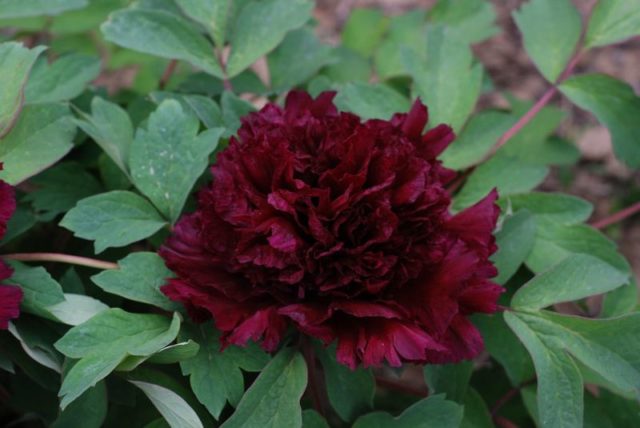
Black pearls bloom at the end of June
Highlight
The herbaceous variety of burgundy peony is characterized by very lush flowering. Highlight brings double buds on tall, above 1 m, stems; the buds are dark burgundy in color, similar to tongues of fire.
A distinctive feature of the variety is late flowering. Unlike most burgundy varieties, Highlight does not bloom in June, but only at the end of August.
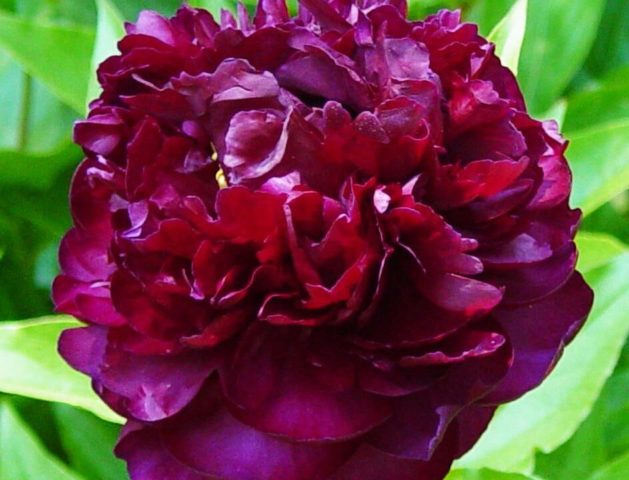
Highlight has drooping stems and may require staking
Sword Dance
Compact but tall variety grows up to 90 cm and has strong, straight stems. It blooms profusely, bearing large dark burgundy buds with yellow-reddish staminodes in the center. A special feature of the variety is its resistance to heat and sunny weather - in illuminated areas on clear days it does not fade or lose color.
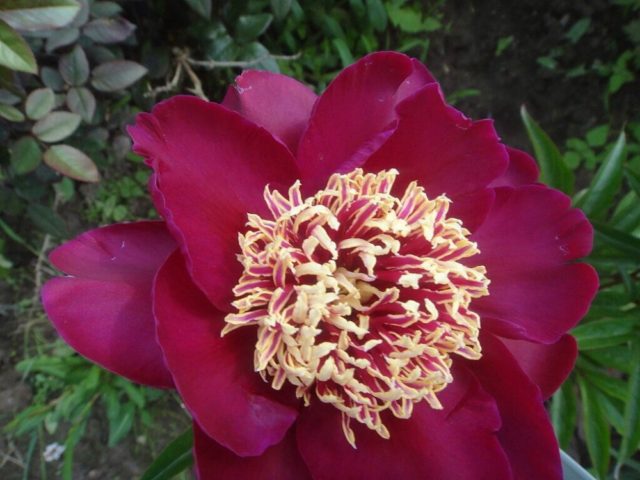
Sword Dance begins flowering in June and early July
Peter Brand
A very old and famous variety, bred back in the 1930s, reaches 90 cm in height.The peony stems are strong and strong, the leaves are green with a rich color, and up to 3 buds grow on each stem. The flowering color is burgundy; the width of the buds can reach 18 cm. The Peter Brand variety is characterized by increased resistance to diseases.
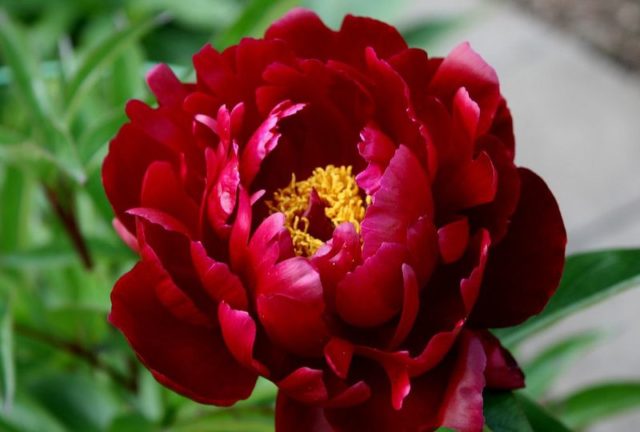
Peter Brand - a variety suitable for growing in partial shade
Dragon flowers
A very tall burgundy peony rises up to 2 m above the ground. The buds of the variety are double, purple-burgundy in color, large - up to 25 cm each, sometimes acquiring a purple tint. The bushes bloom very profusely; up to 70 buds can be collected on one plant. The Dragon Flower variety has large, bright green leaves.
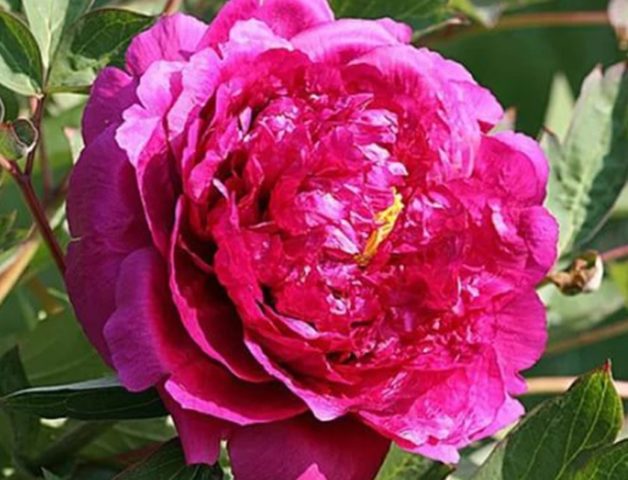
Peony Dragon Flowers retains its decorative effect for 2 weeks
Red Charm
The hybrid herbaceous variety blooms very early - the buds bloom already at the end of May. The height of the peony bushes is 75 cm, the flowers of the variety are burgundy with a wine tint; closer to autumn their color becomes darker. The width of Red Charm buds grows up to 20 cm; their structure is terry and spherical in shape.
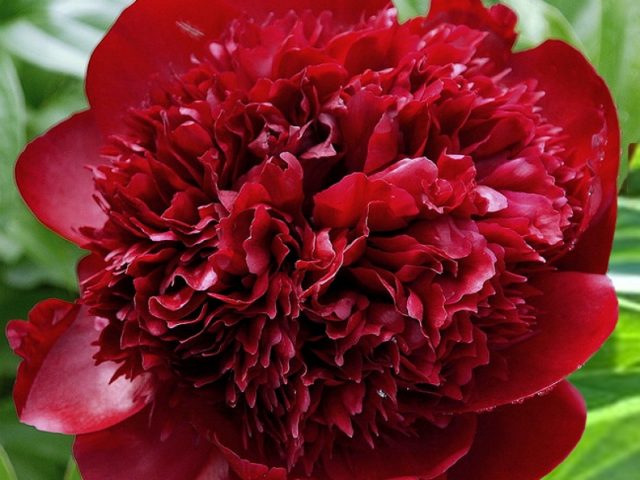
Red Charm leaves acquire a reddish color in autumn
Henry Boxtos
Hybrid burgundy peony has strong stems about 90 cm tall and light green leaves. The flowers of the plant are dark burgundy, with a noticeable garnet tint, double in structure and reminiscent of rose buds. The flowers reach 20 cm in width and are slightly fluffy at the ends. The variety blooms densely.
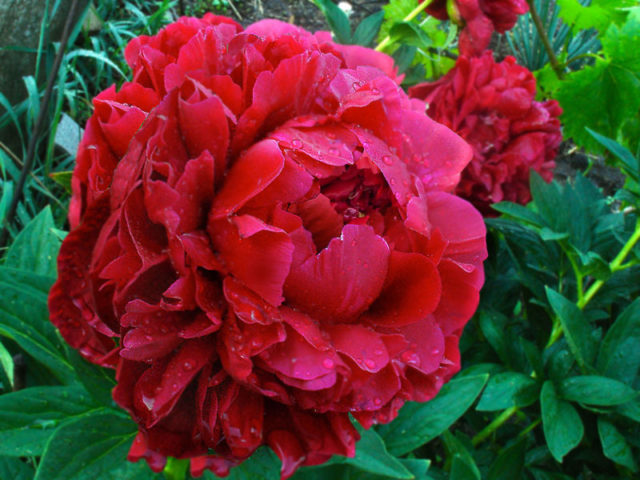
Henry Boxtos fades slightly in direct sunlight
Chokelit Soulde
The medium-sized dark burgundy peony rises an average of 70 cm and bears small buds up to 16 cm each.The flowers of this variety are dark cherry in color, very beautiful, with chocolate notes; there may be golden “splashes” on the petals. In the center of double and semi-double buds there are dark staminodes with yellow tips.
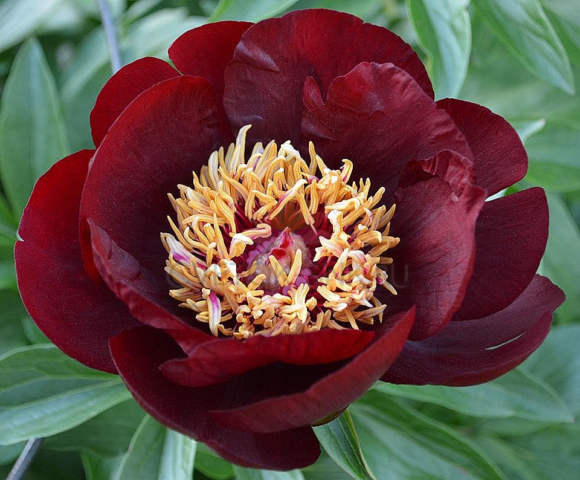
Chokelit Soulde can produce double and semi-double buds on one bush
Tornado
A fairly tall variety grows up to 90 cm. It has strong stems with green leaves, with a burgundy double flower on each stem. The diameter of the buds is about 11 cm, with yellowish stamens located in the center. The variety is characterized as resistant to unfavorable growing conditions; Tornado is rarely affected by diseases.
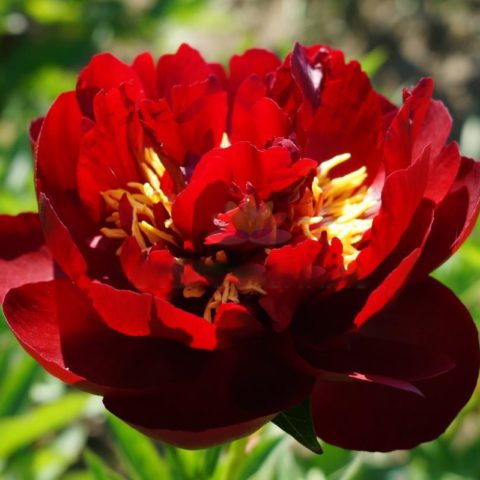
Tornado is convenient because it tolerates drought and poor soils well
The use of burgundy peonies in design
In the garden landscape, burgundy peonies are used very widely:
- Most often they are planted in areas in the immediate vicinity of the house - on the sides of the porch, near the walls, next to the gazebo. With this arrangement, perennials are clearly visible and also allow you to clearly highlight the area.
Peony bushes attract attention to the selected area
- Burgundy peonies are actively used in front gardens, as part of flower beds and group compositions.
A flowerbed with peonies looks lush, even if there are no other plants on it
- With the help of plants, you can form a small hedge that divides the garden into separate zones.
The hedge of flowers does not rise high, but attracts the eye
- Peony bushes look beautiful near fences; they allow you to enliven the landscape and cover empty space.
Peony bushes are often planted near fences to avoid leaving vacant lots
Peonies are best combined with lilies, daisies, lupins and phlox.They can be planted next to any perennials that prefer sunny places.
But it is better not to plant flowers in close proximity to tall trees and dense bushes. In this case, strong neighbors take away moisture and nutrients from the peonies, causing flowering to be less abundant. In addition, against the background of trees and shrubs, flowering burgundy perennials do not look so bright and spectacular.
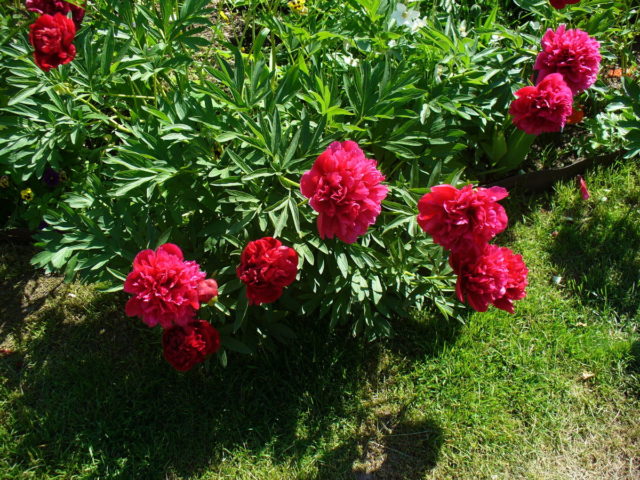
It is better not to plant peonies directly under trees.
Planting and caring for burgundy peonies
Burgundy peonies are unpretentious flowers to grow. It is enough to choose a good place for them and follow the basic rules of care:
- It is recommended to plant peonies in well-lit areas - the flowers love sunlight. At the same time, there should be tall buildings nearby that will provide the peonies with cover from drafts and strong winds.
- The soil for burgundy peonies should be dry. Before planting peonies, you need to organize drainage on the site and enrich the soil with wood ash, humus and mineral fertilizers.
- Plants are planted in the ground mainly in September. Spring planting is acceptable, but not recommended. The hole for the perennial should be deep, about 80 cm, since its root system grows quickly.
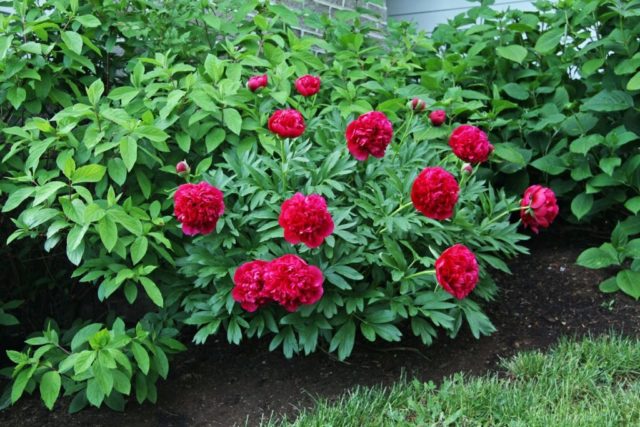
Bushes should be planted close to buildings, but in sunny places
Caring for burgundy peonies is not particularly difficult. Flowerbeds need to be watered weekly, if there is no precipitation; after watering, the soil at the roots is loosened and weeds are removed.The flowers are fed three times a season - with nitrogenous fertilizers in early spring, complex minerals during the flowering period, potassium and phosphorus 2 weeks after flowering. When the burgundy buds dry out, you will need to trim the flower stalks.
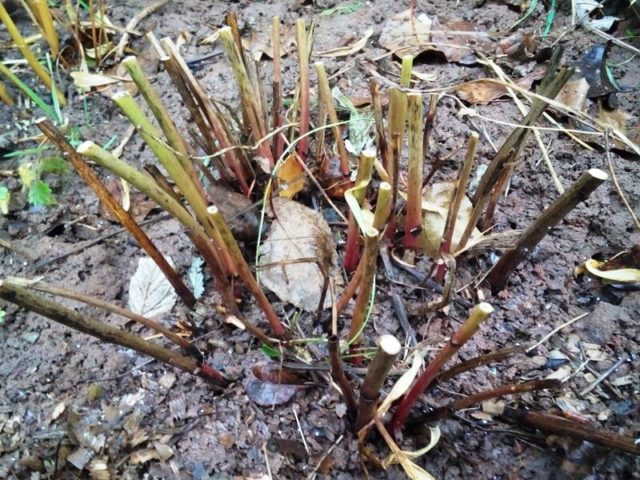
For the winter, it is customary to trim the bushes almost to the ground.
Diseases and pests
Garden burgundy peonies often suffer from fungal diseases and insect pests. We can list several of the most dangerous diseases of perennials:
- Rust. When infected with this disease, the green leaves of a burgundy peony become covered with orange, reddish and brown spots in the shape of “pads”. If you do not begin to treat the disease, the plant will die, and the fungus will spread to neighboring peony bushes.
Rust leaves a characteristic reddish coating on peony leaves.
- Gray rot. The disease affects burgundy peonies entirely - from roots to buds. The first symptom is the withering of young shoots in the spring and the appearance of brown spots at the root collar. After some time, a grayish coating similar to mold appears on the leaves and stems.
Gray mold can develop from the roots
- Powdery mildew It usually appears as a whitish coating on the upper side of the leaf blades. The disease develops slowly, but affects the decorative appearance, and if left untreated, it can lead to the death of the peony bush.
Powdery mildew covers the leaves with a coating
- Mosaic. With a viral disease, light spots and individual necrotic areas appear on the green leaves, the peony weakens and begins to fade.It is impossible to cure mosaic; the affected perennial is simply destroyed.
Mosaic - an incurable disease of peonies
The fight against curable fungal diseases is carried out mainly with the help of Bordeaux mixture and specialized solutions - Fundazol and Figon. When treating diseases, all affected parts of the burgundy peony must be removed.
As for pests, the following are especially dangerous for the plant:
- ants - insects feed on the syrup secreted by the buds, and along the way they can eat the leaves and petals;
Ants eat flower buds
- aphid - buds and shoots suffer from this insect, since the pest feeds on the vital juices of the plant;
Aphids are a dangerous pest of peony bushes because they drink juices from the leaves.
- nematodes - worms mainly infect the roots; if infected, all that remains is to destroy the bush and disinfect the soil;
It is impossible to save a peony bush from a nematode
- bronze - a beautiful beetle causes damage to burgundy peonies, as it eats petals and leaves.
Bronzewort eats petals and can destroy flowers
The fight against aphids, ants and bronze insects is carried out using a soap solution, Actellik or Fitoverm. During spring and summer, it is recommended to regularly inspect flower beds with peony bushes in order to notice pests in time and immediately begin to fight them.
Conclusion
Burgundy peonies are very beautiful perennial plants that require minimal care when growing. There are quite a few varieties of the crop, so for each garden you can choose a variety with the optimal bush height and the desired shade of flowering.

